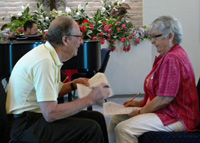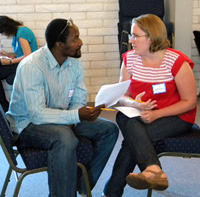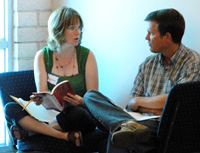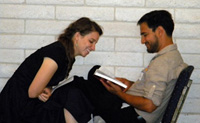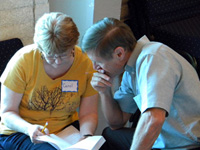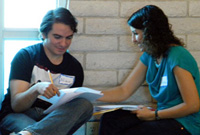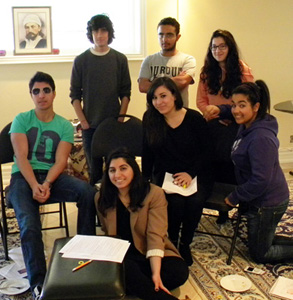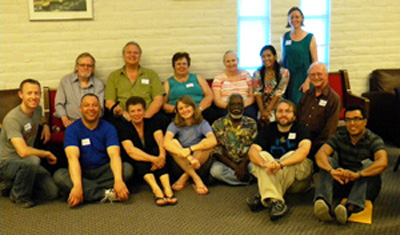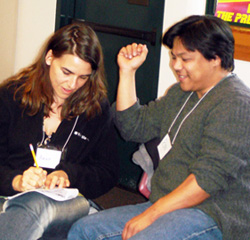Online Learning courses about personal growth, relationships, marriage, parenting, family, community building, strengthening Assemblies, and more that are practical and Baha'i Faith based (individual initiative; not sponsored by an institution) are available through https://www.transformationlearningcenter.com/

From the Bahá’í Teachings and Administration:
"Bend your energies to whatever may foster the education of men." (Bahá’u’lláh, Gleanings from the Writings of Bahá’u’lláh, p. 9)
“Learning in action is becoming the outstanding feature of the emerging mode of operation.” (Universal House of Justice, 1-17-03)
“The more we do, the more we learn.” (International Teaching Centre, 9-30-07)
“This evolution in collective consciousness is discernable in the growing frequency with which the word ‘accompany’ appears in conversations among the friends, a word that is being endowed with new meaning as it is integrated into the common vocabulary of the Bahá’í community. It signals the significant strengthening of a culture in which learning is the mode of operation, a mode that fosters the informed participation of more and more people in a united effort to apply Bahá’u’lláh’s teachings to the construction of a divine civilization, which the Guardian states is the primary mission of the Faith. Such an approach offers a striking contrast to the spiritually bankrupt and moribund ways of an old social order that so often seeks to harness human energy through domination, through greed, through guilt or through manipulation.” (Universal House of Justice, Ridván 2010)
"...[T]he provision of guidance on administrative matters such as the laws of engagement, marriage, and divorce falls under the purview of Local and National Spiritual Assemblies; while Bahá’ís who are professional counselors are free to share with the friends extracts from the Bahá’í Writings and to offer advice of a general nature, it is best that they refer the friends in the first instance to their Local Spiritual Assemblies when questions arise about the application of the laws and Teachings of the Faith." (On behalf of the Universal House of Justice to an individual, September 24, 2014)
Please see below for education opportunities.

What Is Relationship, Marriage, Parenting, and Family Education?
Perspectives from Marriage Transformation®
Marriage Transformation has created a vision and action document to assist individuals, Assemblies, and communities with ideas for how to include education as part of the rhythm of community life: Relationship, Marriage, Parenting, and Family Education in the Bahá’í Faith Community, Potential Ideas and Actions to Consider from Marriage Transformation®, Version: July 15, 2025 (pdf)
Note: The educational resources about these topics have grown globally over the last decades as a means of equiping people to be more successful at sustaining marriages and families. Education is not the same as counseling, although it may be delivered at times by someone trained as a counselor. There are many different types of education experiences and a diversity of materials available from a wide array of sources. One source is online courses offered through this platform provided by Marriage Transformation: https://www.transformationlearningcenter.com/
Systematic Education Based on the Bahá’í Writings
Note that marriage, marriage preparation, and family are included in Ruhi Book 12, "Family and Community" as part of the global institute process. However, it is important to note that there is no one system for Bahá’í relationship and marriage education. The methods and focus for any marriage education effort will vary significantly across the planet depending on the needs of the population and available resources. Communities will make decisions about whether to use materials already developed by a variety of organizations and institutions or those that develop locally as needed. Those involved will utilize learning-in-action to discern what works.
“As you know, courtship practices differ greatly from one culture to another, and it is not yet known what pattern of courtship will emerge in the future when society has been more influenced by Bahá’í Teachings. However, there is no indication that it will resemble the practices extant in existing cultures…. In this interim period, the friends are encouraged to make great efforts to live in conformity with the Teachings and to gradually forge a new pattern of behavior, more in keeping with the spirit of Bahá’u’lláh’s Revelation.” (Universal House of Justice: August 28, 1994, to an individual)
A Description of Relationship and Marriage Education
The field of relationship, marriage, parenting, and family education focuses on enhancing knowledge and skills in individuals, couples, and families, as well as preventing future issues. It aims to empower people to build marriages that bring healthy, happy stability and unity to families and communities. This field incorporates findings from scientific research and the experiences of professionals working with clients, participants, and groups.
Education in this area can include activities such as reading books, studying in groups, taking in-person or online courses, participating in workshops, mentoring, and counseling. It provides vital knowledge, skills, and attitudes about relationships, marriage, re-marriage to someone new, parenting, and family functioning to support a gradual, organic transformation process. When the benefits of this field are combined with Bahá’í teachings, they create a powerful harmony of resources.
This type of education enhances capacity, understanding, and skills. Ideally, it prepares individuals to be healthy people with strong character virtues and qualities who can become successful partners in relationships and marriage. It includes preparation for relationships and marriage for individuals and couples of all ages and experience levels. It offers marriage-boosting tools for healthy couples who want to keep learning, growing, and improving. It works well with spiritual and professional counseling for troubled marriages. It also involves skill development for those who are parenting and provides support for those building and maintaining families. Ideally, this type of education continues throughout the lifespan of couples and families.
Relationship, marriage, parenting, and family education serves:
- Unmarried individuals of all ages who are interested in learning about relationships and how to prepare for them
- Couples considering or involved in friendship, dating, courtship, and marriage
- Unmarried individuals and couples thinking about marrying again after divorce or the death of a partner
- Parents of individuals who want to teach their young children about relationships and marriage or who are considering dating, courtship, parental consent, engagement, and marriage
- Newly married couples
- Couples experiencing the usual ups and downs of married life
- Couples facing external challenges affecting their relationship
- Couples in life-stage transitions, such as becoming parents, guiding teenagers, children leaving home, or retirement
- Parents who want to raise children according to Bahá’í principles
- Couples with strong marriages who enjoy enriching their relationship further
- Challenged married couples seeking knowledge and skill-building, with support from the Spiritual Assembly and professionals
What Relationship and Marriage Education is Not
Relationship, marriage, parenting, and family education is not counseling or therapy, although counselors can incorporate it into their services. It’s not usually intended for couples and families who are in active crisis and facing major issues that a counselor best addresses. While marriage education can offer skill-building and support for couples considering separation or divorce, these couples typically require additional assistance from a trained couple’s counselor and consultation with a Spiritual Assembly.
The timing of education might not be suitable during an active crisis or sudden decline. Symptoms of a crisis could include:
- serious signs of estrangement or aversion
- daily conflict
- any type of coercive, abusive, violent, or addictive behavior
- infidelity (including pornography use
Seriously challenged couples and families might find education in groups or workshops discouraging or difficult if others have a much healthier experience in their relationships. Troubled individuals could also disrupt or discourage others who are not in crisis.
Individual Transformation and Relationship to the Laws (downloable pdf); provided on behalf of the Universal House of Justice to an individual 9-24-14

Community-Based Pre-Marriage Preparation
and Marriage Education
Transforming the global society starts with individual transformation and transformation in our marriages and families. Consider the value of incorporating premarital and marriage education into your individual, family, and community life.
~~~~~~~~~~~~~~~~~~~~~~~~~~~~~~~~~~~~~~~~~~~~~~~~~~~~~~~~~~~~~~~~~~~~~~~~~
Online Learning courses about personal growth, relationships, marriage, parenting, family, community building, strengthening Assemblies, and more that are practical and Baha'i Faith based (individual initiative; not sponsored by an institution) are available through https://www.transformationlearningcenter.com/
~~~~~~~~~~~~~~~~~~~~~~~~~~~~~~~~~~~~~~~~~~~~~~~~~~~~~~~~~~~~~~~~~~~~~~~~~

